|
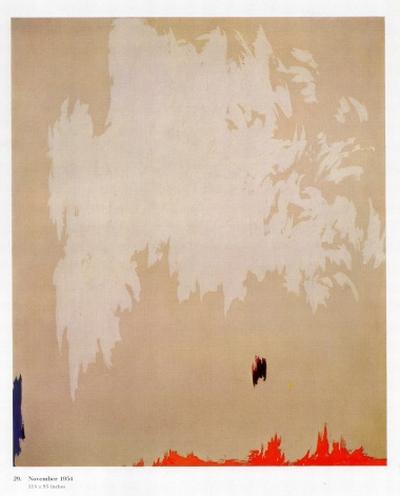
November
1954
Clyfford Still
b. Nov. 30, 1904
_______________________
Our Animals, Ourselves
Justin E.H. Smith
The Chronicle Review
(....)
The fox did not need to exist in order to function in my imagined community, one which must be judged no more or less real than that of, say, Indonesians, or of humanity. It was enough that there be foxes at all, or creatures that fit that description, in order for me to conjure community with the imaginary fox in the side pasture. And it was no mere puerile phantasm that caused me to imagine this community, either. It was rather my thinking upon my own humanity, a condition which until very recently remained, over the course of an entire human life, embedded within a larger community of beings.
These days, we are expected to grow out of that sort of thinking well before puberty. Our adult humanity consists in cutting off ties of community with animals, ceasing, as Lévi-Strauss put it, to think with them. When on occasion adults begin again to think about animals, if not with them, it is to assess whether animals deserve the status of rights-bearers. Animal rights, should there be such things, are now thought to flow from neurophysiological features and behavioral aptitudes: recognizing oneself in the mirror, running through mazes, stacking blocks to reach a banana.
But what is forgotten here is that the animals are being tested for re-admission to a community from which they were previously expelled, and not because they were judged to lack the minimum requirements for the granting of rights. They were expelled because they are hairy brutes, and we learned to be ashamed of thinking of them as our kin. This shame only increased when Darwin confirmed our kinship, thus telling us something Paleolithic hunters already knew full well. Morality doubled up its effort to preserve a distinction that seemed to be slipping away. Since the 19th century, science has colluded with morality, always allowing some trivial marker of human uniqueness or other to function as a token for entry into the privileged moral universe of human beings. "They don't have syntax, so we can eat them," is how Richard Sorabji brilliantly reduces this collusion to absurdity......(more)
.....................................................
Harriet Ritvo
On her book Noble Cows and Hybrid Zebras: Essays on Animals and History
rorotoko
Kathy Rudy
On her book Loving Animals: Toward a New Animal Advocacy
rorotoko
Joe Roman
On his book Listed: Dispatches from America’s Endangered Species Act
rorotoko
_______________________
Protection for the Powerless: Political Economy History Lessons for the Animal Welfare Movement
Jerry L. Anderson
Abstract:
In the last several decades, animal agriculture has experienced a dramatic shift in production methods, from family farms to concentrated industrial operations, with societal consequences comparable to the Industrial Revolution of the nineteenth century. The new confinement operations raise significant moral questions regarding the humane treatment of animals subject to modern methods that emphasize economics over animal welfare. The success of the animal welfare movement, however, hinges on whether society will adopt regulations, based on moral considerations, that are directly opposed to its economic self-interest. The situation is remarkably similar to the plight of child laborers caught in the transformation of manufacturing methods during the Industrial Revolution. This article uses the history of child labor reform to construct a model for how society enacts protections for politically powerless groups, such as children and animals. Using the insights of new social movement theory, the article concludes that animal welfare reform will require a complex mixture of resources, including the difficult task of norm development. While the path to such reform is long, the child labor history shows that success is possible.
Social Science Research Network (SSRN)_______________________
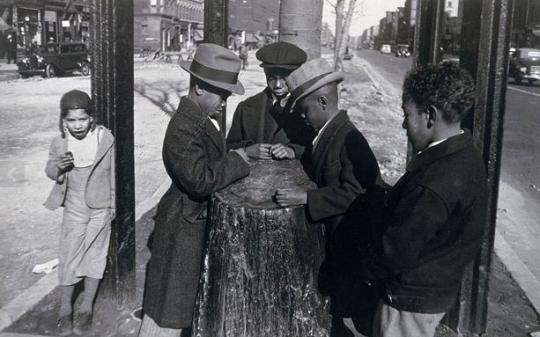
The Wishing Tree
1937
Aaron Siskind _______________________
contemporary poets from Australia
assembled by Pam Brown
jacket2
The Anaglyph
John Tranter
Hasn’t the charisma leaked away from the café crowd, and that other
Authority, the Salon des Refusés? I have forgotten much of
That old sack of enthusiasms and snake-oil recipes, the way
You have forgotten your own childhood, since
You woke up just in time to watch the adults disappear
From the world they had bequeathed us. It seems the scenery all around
Is hilly and unfarmable. Being brilliant has been reckoned
Into a procedure by some old guy, with a motto that is
More fitness, less flab. I hanker to go back to the land.
This means ruin to the culture-watchers. But the basic
Principle of my ambition is to be one excessively distracted
Entity at the mercy of the lurid, blurred and half-perceived
Motions of the Martians at the Halloween Hop. Fake? They sure are.
Summer is called Humidor here, the month of damp draughts.
The tale of my attempt to farm stubborn soil leaked from
Untruth to legend, my unlikely phase of boy-scout honesty being
Before I came to the big city. ...
...(more)
_______________________

Rochester
Minor White _______________________
The resurgence of the civic
Adrian Pabst
(....)
The Occupy movement is an expression of popular outrage and mobilization that is not beholden to certain anarchist or communist extremes that dominated many anti-globalization movements in the late 1990s and early 2000s. Nor is today’s popular protest connected with any established political forces that can co-opt and manipulate it. As such, the worldwide wave transcends single-issue campaigns, social movements, and political protest in the direction of a civic community that seeks to (re-)establish the priority of the social over the economic and the political by (re-)embedding states and markets in the civic bonds and interpersonal relationships of civil society.
Linked to the primacy of shared “civicness ”is an interesting development beyond the categories and practices of postmodern pluralism. The latter either absolutizes difference (however spelt), which leads to conflict that can only be regulated by power, or else it strives to convert the “other” into the “same” through ahistorical, supposedly universal but in reality narrowly Western secular categories such as values of “liberation” and “emancipation” linked to the political left or values of “freedom of choice” and “opportunity” associated with the political right. In a strikingly different configuration, the glocal protest movement neither sacralizes otherness nor erects absolute divisions. Rather, it attempts to break down the barriers that shield the governing elites from democratic accountability by pursuing a politics of the common good in which all citizens can share. As such, the glocal protest movement seeks to reassert broad civic control over the economy and politics, democratize both states and markets, and reintroduce popular participation into political representation. Thus, we are seeing the resurgence of the civic that blends individual and group rights with mutual help and reciprocal responsibility.
...(more)
_______________________

Windowsill Daydreaming
Minor White
1958
_______________________
Arabesque
Martin Burke
(....)
I speak simple things –shall I use simple speech?
Shall I say the darkness understands the light but cannot grow to love it?
Words among words, the fire at certain altars
Aeschylus, and others, walking amid ruination and glory
Antigone smiles, Electra smiles, what they know cannot be disputed
The geometry of the future has been uttered
Out of the past but out of the future also the teaming sea at daybreak, at nightfall
Cities awaiting vivid pronouncements, labyrinths, mirrors, maze of inner-city lanes
(also a mirror)
My face visible, my handwriting also on letters on a desk near a window
One day we will call ‘Home’ what we now call the unknown
...(more)
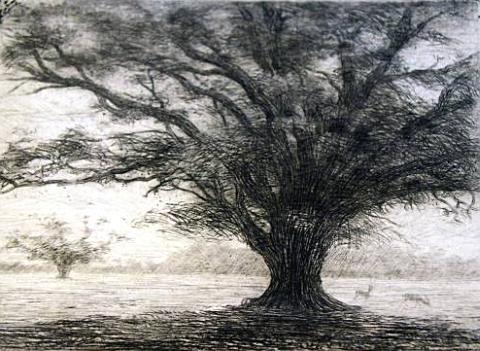
Józef Pankiewicz
b. Nov. 29, 1866
_______________________
Autumn at Taos
DH Lawrence
guardian poem of the week
Over the rounded sides of the Rockies, the aspens of autumn,
The aspens of autumn,
Like yellow hair of a tigress brindled with pines.
Down on my hearth-rug of desert, sage of the mesa,
An ash-grey pelt
Of wolf all hairy and level, a wolf's wild pelt.
Trot-trot to the mottled foot-hills, cedar-mottled and pinion;
Did you ever see an otter?
Silvery-sided, fish-fanged, fierce-faced, whiskered, mottled.
When I trot my little pony through the aspen-trees of the canyon,
Behold me trotting at ease betwixt the slopes of the golden
Great and glistening-feathered legs of the hawk of Horus;
The golden hawk of Horus
Astride above me.
But under the pines
I go slowly
As under the hairy belly of a great black bear.
...(more)
_______________________
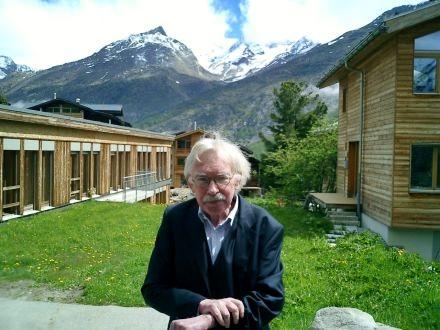
Friedrich Kittler
(June 12, 1943 – October 18, 2011)
"We only have ourselves to draw upon"
An interview with German media theorist, Friedrich Kittler
by Andreas Rosenfelder
(....)
When I turned 33, the age of Christ, I looked at my box of notes and realised how many topics I had assembled that I still wanted to write about. But this life is not long enough. All the colours that poetry has used to describe the moon, for example, are listed on A6 orange cards. I am consoled by the thought that someone who wants to know what my unwritten books may have looked like can reconstruct this pretty well, in case I keel over all of a sudden.
(....)
Are you interested in Facebook?
No, not remotely. It gives me the uncanny feeling that normal people have become so unimportant for those in power and business that self-presentation is the last resort. When I arrived in California for the first time and went up Telegraph Avenue in Berkeley heading for campus, I passed a playing field full of exhibitionists running about. People dressed as harlequins begging for money or smoking dope. When I then entered campus and looked at the people there, they lowered their eyes. People either seem completely depressed or they put on a huge show and telephone loudly in the train restaurant.
...(more)
via spurious
Kittler and the Sirens
Tom McCarthy
Kittler’s aura seemed to hover over the whole city; by the end of my stay there I wondered whether taxi drivers and Imbiss-stand operators might be protégés or associates as well. He seemed to lurk, invisible, beneath the intersection-points between the worlds of art, philosophy and politics, his bodily presence transmuted into riffs that multiplied like echoes across exhibition catalogue essays and club fliers and general public banter. Whenever I heard someone mention Ovid and feedback loops or Hölderlin and binary code in the same sentence, I knew that I was listening to the master’s voice piped down a hotline from the inner sanctuary at Humboldt where, like Hegel two centuries before him, he’d established his HQ....(more)
via Rhys Tranter
_______________________
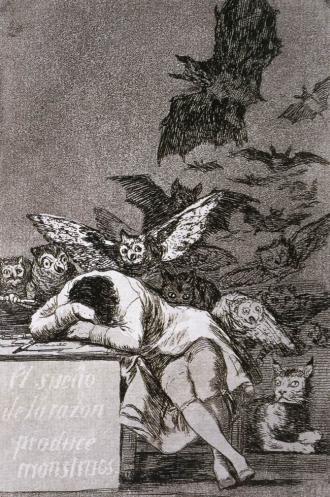
The sleep of reason produces monsters
1797 - 1798
Goya
_______________________
Jerome Rothenberg Poems
The Sleep Of Reason
for Clayton Eshleman
Words imprinted on a sign
by Goya glowing
white against a surface
nearly white:
the sleep of reason
that produces monsters.
He is sitting on a chair
his head slumped
resting on his arms
or on the marble table,
pencil set aside,
his night coat open
thighs exposed.
All things that fly at night
fly past him.
Wings that brush an ear,
an ear concealed,
a memory beginning
in the house of sleep.
His is a world where owls
live in palm trees,
where a shadow in the sky
is like a magpie,
white & black are colors
only in the mind,
the cat you didn’t murder
springs to life,
a whistle whirling in a cup,
gone & foregone,
a chasm bright with eyes.
There is a cave in Spain,
a fecal underworld,
where bats are swarming
among bulls,
the blackness ending in a wall
his hands rub up against,
a blind man in a painted world,
amok & monstrous
banging on a rock.
[From "50 Caprichos after Goya" in Concealments & Caprichos, Black Widow Press, 2010]
...(more)
AlligatorzineJerome Rothenberg at EPC and the Poetry Foundation
_______________________
The Camp Is the World:
Connecting the Occupy Movements and the Spanish May 15th Movement
Luis Moreno-Caballud and Marina Sitrin
There are three key elements that have made the global movements of 2011 so powerful and different: the extraordinary capacity to include all types of people; the impulse to move beyond traditional forms of the protest and contention, so as to create solutions for the problems identified; and the horizontal and directly participatory form they take.
(....)
The creation of alternative institutions and solutions has already begun in the United States. With or without encampments, the constructive phase of the Occupy movement is here, and all indications are that it will not slow down, as it has not slowed down in Spain. Every day on the news and on youtube, we see the police removing the occupiers from parks and plazas, but the movement continues to grow – and to grow outside of these places. While the tumult of raids and returns jolts occupiers and the public alike, thousands of working groups around the world meet weekly in libraries, community centers, churches, cafes, and offices to share their extraordinary abilities and resources. They are already creating the schools, hospitals, houses, neighborhoods, cities, and dreams of the 99 percent.
This is the beginning of the occupation of an encampment that will never be dislodged: the world....(more)
_______________________
A secret Republican group bent on defeating a Republican because that Republican isn't seen as ideologically insane enough to truly represent their crazy-ass party? Well, we can't say we didn't see that one coming. The ideological hoops you have to jump through these days in order to be considered a true conservative have become too numerous to count. First, George W. Bush was excommunicated from conservatism, and even called a "liberal" by some. Then it spread to Congress and the Senate. Now you're not a "true" conservative unless you want to roll back eighty years of government, replace the Constitution with the Ten Commandments and fire illegal immigrants out of a cannon into an electrified alligator-filled lake of molten sulfur.
-
Hunter/Daily Kos
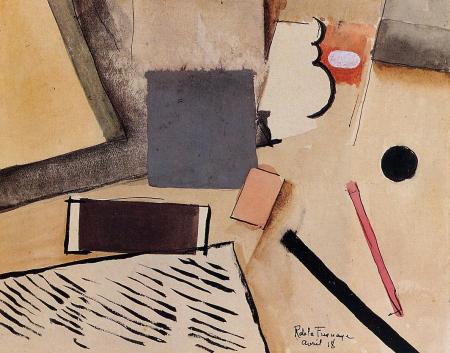
The Penholder
Roger de la Fresnaye
1918
_______________________
Dusie Kollektiv - issue 5
edited by Susana Gardner
from
lake,[pdf]
rob mclennanlake, nowhere
hard to let it be
i love the lure of language
along your lips
Stephen Cain, Torontology
skyline pure of sky; the water, lakes
a nervous lap
my shining errant knight in glitter,
lip-gloss
between envy & the moon, financial districts
, cn tower blooms
in light-show nocturnes; you woke,
discovered stomach cramps & this,
basaltic rock you mention, standing
the circle stain
quick glances down one side
three hundred passing passing ships,
sails like silver, flags
a threadbare ease, a base of trees
at merlot’s end
no one is an island; you are,
...(more) [pdf]
_______________________
Misanthropy’s Holiday
Kathleen Peine
(....)
Even the most thick-headed Americans know that the only time you are targeted in your free speech or assembly is when it jacks around with the big boy money. You can hang out at funerals, calling the deceased “fags worthy of death” and this won’t be met with pepper spray. Nobody will trick you into stepping in the street so they can arrest you. Because that nonsense doesn’t interfere with commerce and advances the notion that the country tolerates unpalatable free speech (it’s the palatable stuff with the potential to spread that gets the pepper treatment). You are also free to bring guns to “protests” against government health care if you like. And you can hang around on sidewalks without bathrooms if you brought your wallet. Hell, defecate on a car if you want- Visa or American Express, sir?
I get the usual visceral disgust when I see the footage or hear others talking about their Black Friday plans, but I am trying to remove myself from all my rancid sanctimony this year. An aside, a sanctimonectomy is almost as expensive as an exasperectomy, but you all know that....(more)
_______________________
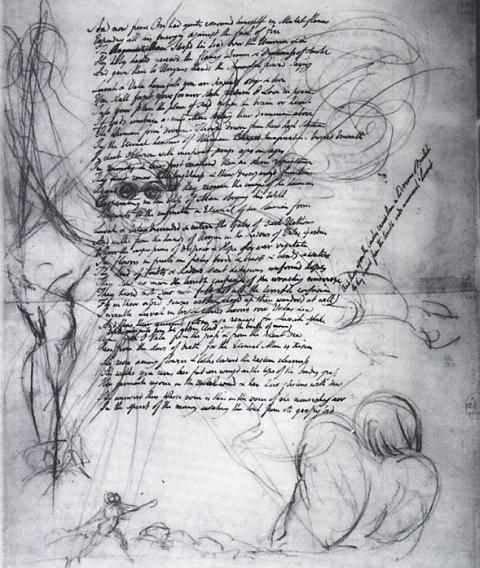
p. 126 of The Four Zoas
William Blake
b. November 28, 1757
The Blake Digital Text Project
It is an easy thing to talk of patience to the afflicted,
To speak the laws of prudence to the houseless wanderer,
To listen to the hungry raven's cry in wintry season
When the red blood is fill'd with wine & with the marrow of lambs.
It is an easy thing to laugh at wrathful elements,
To hear the dog howl at the wintry door, the ox in the slaughter house moan;
To see a god on every wind & a blessing on every blast;
To hear sounds of love in the thunder storm that destroys our enemies' house
To rejoice in the blight that covers his field, & the sickness that cuts off his children,
While our olive & vine sing & laugh round our door, & our children bring fruits and flowers.
Then the groan & the dolor are quite forgotten, & the slave grinding at the mill,
And the captive in chains, & the poor in the prison, & the soldier in the field
When the shatter'd bone hath laid him groaning among the happier dead.
It is an easy thing to rejoice in the tents of prosperity:
Thus could I sing and thus rejoice: but it is not so with me.
-
William Blake, from The Four Zoas
Re-Visioning William Blake's The Four ZoasDonald Ault
_______________________
The new gilded age
Dante Atkins
Not very long ago in American politics, it would have been hard to imagine a scenario in which the frontrunner competing for the nomination of a major political party in America would be advocating for the repeal of child labor laws and suggesting that the children of poor families do the often-dangerous work of cleaning up after their wealthier classmates. But Newt isn’t the only one to do so. Paul LePage, the arch-conservative governor of Maine who was swept into power last cycle, made noise by advocating for the repeal of his state’s child-labor laws when he wasn’t too busy removing murals honoring the labor movement or trying to make it more difficult for residents to vote. Steve Benen's blog at Washington Monthly mentions other incidents of Republicans attempting to weaken child labor laws, including the opinion of Sen. Mike Lee (R-UT), who believes that such laws are unconstitutional. Benen states his outrage thus:
Remember when there were accepted political norms that helped define the American mainstream? Basic policy tenets that both major parties accepted, largely without question?
I don’t know when or if those days are coming back. ...(more)
_______________________

Le Diabolo
1914
Roger de la Fresnaye
d. Nov. 27, 1925
_______________________
Interview: William Leiss
CTheory
... by virtue of his many actions in supporting Nazism, including "homogenizing" his philosophical concepts with those of Nazi philosophy, Heidegger turned his own texts into blood-soaked documents. (This is the real blood of the millions of Nazi victims, not the metaphysical substance referred to in the idiotic phrase Blut und Boden.) He himself -- and no one else -- placed his thought at the service of vicious criminals and mass murderers, acting entirely voluntarily and under no external threat to his personal safety. This is to me a fair evaluation of the situation, based on a documented record of events.
What follows from this? In the first place, it is a matter of historical accuracy. But I would never suggest to anyone that they should not read those texts and draw whatever insight they can from them. I would only add the caution that they are compromised texts, by which I mean that their author placed them, deliberately and with full knowledge of the surrounding events, in a specific context -- namely, the great Nazi crimes, which can be understood and memorialized but never forgiven -- that is relevant to their meaning and significance in the history of philosophy....(more)
_______________________
Under the Influence of Ideals
Mary Jo Bang
The extra fine ingredients sift down on you
or stir at your feet and cover your shoes
with the dust of it. The back of your hands,
dusted. Some fine glass particles stick.
The long bath only removes the thin layer
that can be removed. Everything else
is taken in and kept. You stand up
when you can to the curled lip,
some dogface raking back the curtain
to expose the starving. Who isn’t on edge?
...(more)
Fence
fall 2011
_______________________
Digital Activism Decoded: The New Mechanics of Change
Mary Joyce (ed.)
pdf available at Monoskop/log
...contributions by Trebor Scholz, Dan Schultz and Andreas Jungherr, Brannon Cullum, Katharine Brodock, Tom Glaisyer, Anastasia Kavada, Tim Hwang, Steven Murdoch, Dave Karpf, Simon Columbus, Rasmus Kleis Nielsen, Sem Devillart, Brian Waniewski _______________________
Roots to Grow:
The Need for Radical Spaces in Movement-Building
Lisa Moore
audio interview
Vancouver Cooperative Radio
_______________________
Darklife: [pdf]
Negation, Nothingness, and the Will-To-Life In Schopenhauer
Eugene Thacker
(....)
In the science of extremophiles, two factors – hyperbole and contradiction – intersect to produce a concept of life that ends up questioning the very idea of life itself. The hyperbolic nature of extremophiles highlights the relativistic character of the organism-environment relation. The boundary between an organism living in conditions of low light and one living in conditions of no light becomes blurry. Either one chooses to recuperate the extremophile back within the ambit of traditional science, in which “no light” really means “very very low light,” or one chooses to accept the anomalous condition of “no light” as is, with the implication that light is in no way essential for life.
Tied to this hyperbolic factor is another one, namely the contradictory nature of the extremophiles – or of any example of biological life that fundamentally challenges the premises of the life sciences. Extremophiles are anomalous, not simply because they live without light, but because their living-without-light sets them apart from the existing epistemological qualifiers that ground the ability of human beings to identify and know what life is. In the case of the extremophiles, the hyperbole is the contradiction, or is the paradoxical ground of the contradiction; light and darkness define any environmental condition to some degree, and it is the hyperbolic nature of the environment that leads to the contradictory nature of the extremophile. Biological science, in so far as it is rooted in systematic description and classification, relies on its own principle of sufficient reason, namely that life and logic bear some basic relation to each other – in other words, the principle that all that can be identified and known as life, is ordered or organized in such as way that it can live. The extremophiles are, in a way, examples of living contradictions, a living instance of the inverse relationship between logic and life.
(....)
Parrhesia
A Journal of Critical Philosophy
Issue 12
_______________________

photo - mw
_______________________
Around the pillars of Urthona, and round thy dark limbs,
On the Canadian wilds I fold, feeble my spirit folds.
-
William Blake, America: A Prophecy

photo - mw
_______________________
from Outside the House--the Book of the Wilderness of Paper, Fire, & Clay
Bruce Stater
presented by Jerome Rothenberg
a prelude of questions (to be sung as a chant)
will the poem of the dream
of the book of the house
be such a very long poem?
other poems like these
have been
such very long poems
will the poem of the dream
of the wilderness of fire & clay
outside the book of the house
abide within the poem
of the dream
of the book of the house?
...(more)
_______________________
Always on the Train
Ruth Stone
Writing poems about writing poems
is like rolling bales of hay in Texas.
Nothing but the horizon to stop you.
But consider the railroad's edge of metal trash;
bird perches, miles of telephone wires.
What is so innocent as grazing cattle?
If you think about it, it turns into words.
Trash is so cheerful; flying up
like grasshoppers in front of the reaper.
The dust devil whirls it aloft; bronze candy wrappers,
squares of clear plastic--windows on a house of air.
Below the weedy edge in last year's mat,
red and silver beer cans.
In bits blown equally everywhere,
the gaiety of flying paper
and the black high flung patterns of flocking birds.

Ruth Stone
1915 - 2011
_______________________
Reason For Water
From For Water, Say Neró
Barbara Maloutas
octopus
water
what water; what water is missing; and when; before everything; there was never enough water; this island; water surrounds—they say sea; they are aware of—scarcity and all methods of keeping; islanders with water; in water; of water
writing from memory without concern—of structure; this thinking of cisterns—a reservoir—with less than ever; concern for story; never knowing
enough but—remember how easily a low green tanker; just out of sea; water–full–heavy; full—objects of; greater density than—are floating; can; hooked up to a reservoir; pumping at night; in time to harbor; to release
this not knowing is made; membering; a low boat in water—in harbor; the possibility there’s some other—harbor not this one; asking the difference; bare hand; no gloves or a bucket; in hand; so measured—take water; short showers; tight water; a commodity—in memory; in memorium; a reservoir
...(more)

photo - mw
_______________________
Leaves: and their uses as nonsense
Barbara Maloutas
Aufgabe #3
(...)
Leaves and their uses as multiples joined:
The use of thorns, grass stalks or other methods of joinery (such as water) are
necessary but not often lasting.
Joining may produce linear or specific and shapeless flats
Shapeless flats present the least distinction and may be mistaken as native
Specific flats can be extremely intrusive
Considerations of a new place and where touch begins
The craft can be learned and refined – with patience – over years
Assistance happens:
Reasonable speed is vital. Helpers are essential. Once acquiring a reputation,
these are easy to gather. There will be many who wish to be part of a record or
trace of nature. There remains the question of whether an end is ever an end.
A good camera is essential:
The single way to acquire a reputation (and therefore a name), is through
recording projects from beginning to end or the end of recording.
A presence in the frame during recording is not essential
There is no other frame
Editing shapes the narrative
This is not about narrative
...(more)
Coffee Hazilly Barbara Maloutas Beard of Bees Publications
from Later, WetnessBarbara Maloutas tarpaulin sky
_______________________

photo - mw
_______________________
On her book Walled States, Waning Sovereignty
Wendy Brown
rorotoko
(....)
This is not a book that aims to shape policy (except perhaps, to reveal the absurdity of investing so much money, labor, materials, and hope in nation-state wall building at this juncture in history).
Rather, it is a critical investigation of the relationship of sovereignty and walling in our time. My purpose is to open up this relationship for readers: to reveal features of walling and the clamor for walling that aren’t on the evening news.
In contrast to arguments for and against walls based on their political acceptability or technical efficacy, I am offering a less literal way of “reading” border walls and the contemporary desire for them.
...(more)
_______________________
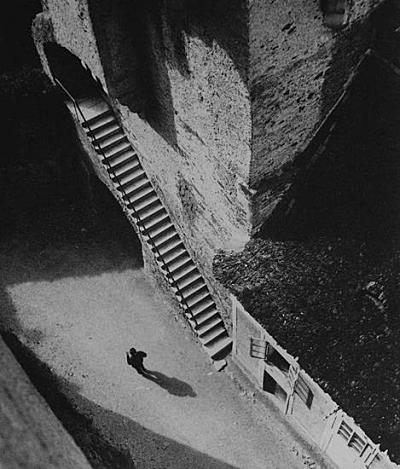
Jan Lauschmann
1920
_______________________
The Poetics of Resistance
Cosmos and History: The Journal of Natural and Social Philosophy
Vol 6, No 2 (2010)

Mariana Cook
_______________________
Voyage loneliness unfinished
therefore lonely? no way to
put it other than the chance
words of loneliness voyage
whatever the voyage may be
or wherever we looked
any of us
tending fires in the galleys
where we'd cook whatever food
would sustain us
through that loneliness.
A fire
even to cook
at sea
is hazardous business but
necessary
and loneliness
yes.
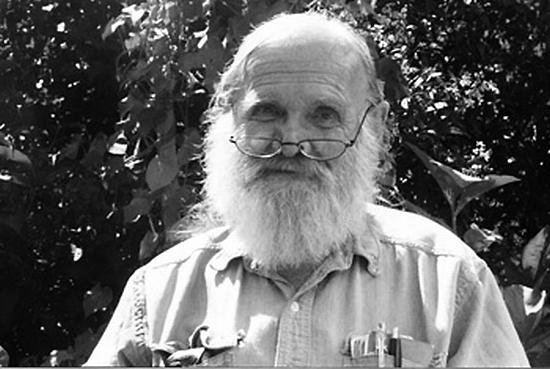
Theodore Enslin
(1925-2011)
Photo courtesy of Alison Enslin
With Great Respect: Theodore Enslin, 1925-2011
Interview with Theodore Enslin
conjunctions
.....................................................
3 sequences from The House Of The Golden Windows
Theodore Enslin
More Than Smoke This Water
(...)
plumed evidence
substantial
drop
level
as Herne's Oak lately discovered in alien country
hart's head in tree bound to oak leathern leaf
winter place
evidence water
elsewhere
shafted
dross flotsam upward against branch
shoreward
ice flake
fretted twig plume
drift against oak
Herne's
leaf bound
waters shift
drop evidence
in
level alien country
past oak hart's
shoreward
plume twig
ice flake
alien
lately discovered
substantial
drop
level as Herne's Oak lately discovered
leathern leaf elsewhere shafted dross
winter place shift
flotsam
against branch
in tree bound
waters shift
leaf bound drift past Herne's Oak as lately discovered
leathern elsewhere dross shafted upward against branch
fretted plume
ice flake shoreward
evidence water
waters shift
bound in alien country
plumed lately
discovered alien
flotsam in tree
as hart's head
shift drift
level
leaf bound
(...)
...(more)
_______________________

Feed Passthrough
Inis Meįin, Ireland
Mariana Cook
Stone Walls: Personal Boundaries
Mariana Cook
amazon link
Dazzling Ingenuity of the Dry Stone Wall
Alice Rawsthorn
(....)
Ms. Cook’s photographs have been published in a book , “Stone Walls: Personal Boundaries,” together with essays by farmers, historians and an archaeologist on the history of dry stone walls in different countries. As well as revealing the beauty and longevity of the walls, the book tells a remarkable design story.
Robust, enduring and environmentally sensitive, a dry stone wall is a dazzling example of design ingenuity and of the possibility of making something useful from found objects that are usually ignored or discarded. A well-built wall can last for over a century, and requires less maintenance than a hedge or fence. It is made solely from found materials and removes no nutrients from the surrounding soil, while providing shelter for rabbits, mice and other wildlife. Insects thrive among the stones, as do lichen and mosses. A dry stone wall is also a model of the old school Modernist design concept that “form follows function.” Its beauty is usually coincidental, because every design decision taken during construction is determined by efficiency. ...(more)
via Jim Johnson_______________________
Becoming-Intense, Becoming-Animal, Becoming-Imperceptible
Gilles Deleuze and Felix Guattari
Chapter 10 from A Thousand Plateaus
ifile pdf
Ideas do not die. Not that they survive simply as archaisms. At a given moment they may reach a scientific stage, and then lose that status or emigrate to other sciences. Their application and status, even their form and content, may change; yet they retain something essential throughout the process, across the displacement, in the distribution of a new domain. Ideas are always reusable, because they have been usable before, but in the most varied of actual modes. For, on the one hand, the relationships between animals are the object not only of science but also of dreams, symbolism, art and poetry, practice and practical use. And on the other hand, the relationships between animals are bound up with the relations between man and animal, man and woman, man and child, man and the elements, man and the physical and microphysical universe. The twofold idea "series-structure" crosses a scientific threshold at a certain moment; but it did not start there and it does not stay there, or else crosses over into other sciences, animating, for example, the human sciences, serving in the study of dreams, myths, and organizations. The history of ideas should never be continuous; it should be wary of resemblances, but also of descents or filiations; it should be content to mark the thresholds through which an idea passes, the journeys it takes that change its nature or object. Yet the objective relationships between animals have been applied to certain subjective relations between man and animal, from the standpoint of a collective imagination or a faculty of social understanding.
_______________________
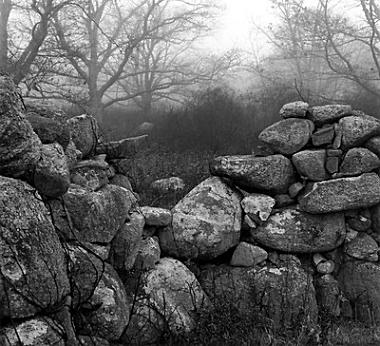
Sheep Shearing Shed Wall in Mist
Chilmark, Mass.
Mariana Cook
_______________________
Translators Steven T. Murray and Tiina Nunnally on Stieg Larsson and Nordic Crime Fiction (audio)
Two Voices
the Center for the Art of Translation
... the pre-eminent translators of Nordic crime fiction, Steven T. Murray and Tiina Nunnally. Since 1984 they have produced award-winning translations, including books by Henning Mankell, Peter Hųeg, Camilla Läckberg, and Mari Jungstedt. Murray is best-known as the translator of the Stieg Larsson Millennium Trilogy, and Nunnally is well-known for translating another runaway bestseller (from the Danish), Smilla's Sense of Snow. The couple were presented in conversation with Sedge Thomson, host of West Coast Live. _______________________
Research on Place and Space
Bruce B. Janz
Identity, Place and Community
Thivai Abhor
Dialogic
_______________________
The Weather Within
Theodore Enslin
(....)
The air how light it is
wind among trees a gentle
sussurus a word exact
as leaves but air so light
the voices of men and women
are like that a sussurus
within a remembrance
of weather the light of winter
flaring abruptly out
the heart beats on in darkness.
(....)
A place swept smooth a place
where sand and wind have agreed
to keep no record each time
a mark appears wind or water
tide or storm will erase it.
The mind is like that for all its memories
it has agreed to none of ours
individual conditions what it keeps
lies deep an animism
collected from all of us
in all conditions our sands swept smooth.
...(more)
_______________________
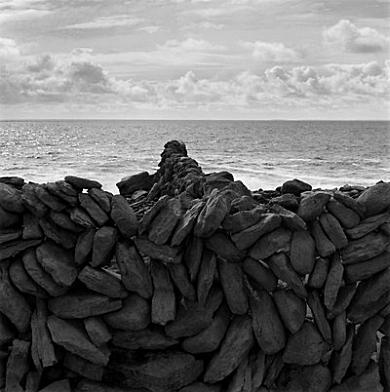
'Sea Wall'
Blackhead, Burren, Ireland
Mariana Cook
There Can Be Beauty in Barriers
Carol Kino on Mariana Cook
Slide Show: Stony Places
Mariana Cook
_______________________
To Build A Cathedral
Theodore Enslin
Beard of Bees Press
(...)
A sheltering
as a sheltering is never finished
it is a structure incomplete
wards off the rain and yet the rain seeps in
the structure rises and obscures what was open
sheltering a view arcane a beginning
seems to be is not complete
pediment to spout a gargoyle
to divert the rain and still seeps in
a water which returns is never finished
cathedral passes in the midst of being
builded of no finished stone
is not to be its finite ending
coming late as the builders sensing
what their forebears could not
concerned with building on a ground not solid
what might seem to be
a business that outlasts its tools
in ruins of a sky around it
a shelter for the moment but outlasting it.
(...)

Léon Herlant, Landscape in snow
c.1910
Belgian Autochromists
_______________________
they cut back sew much on th backs uv th poor
bill bissett
b. Nov. 23, 1939
....)
whats missing from my writing ar all th dramateek
konflikts prsonal we all struggul with how we
escape th crueltee or non rewarding dominans
uv othrs thru we being harsh ourselvs squel 4
our freedom from bull shit skreem 4 our demands
that we b lovd not always rite on sumtimes we ovr
reakt mor drama we ar all such devoteez uv evn
bside th endless atlantik we ar such fish stik toddlrs
bside we caree on all th strugguls duelistik layr
ing uv kontradiktoree tapestereez n eventualee let
go evreewuns konfusd n feeling th guidans n
wondring what is it all th blessings th pain th
journeez th sun bakes us 4give n love n find
as a demand that will seldom work honestlee we need
2 rewrite it make let it glow mor will i evr go
back aftr sumwuns bin harsh 2 me sumtimes its
eazier thn othrs th sun can reapeer it was all a
ms mistr undrstanding othr times its just not
possibul try not 2 think uv it moov on b loving
b ther wundr th road n th bus taking a suddn
curv tho th drivr knows it like th back uv his
hand thru th see saltee inkee nite ium thinking
now 4 a veree littul whil nothing is missing
evreething is alredee heer
...(more)
_______________________

Guy Davenport
b. Nov. 23, 1927
Every Force Evolves a Form
Guy Davenport
ifile pdf
ARIADNE'S DANCING FLOOR
(....)
Eighteen months after the publication of Finnegans Wake, when Joyce
and his family were among the millions of refugees plunged into flight across
Europe by the German armies, five children from Montignac in the Val Dor-
dogne discovered the prehistoric cave Lascaux with its painted animals and
signs, the first flowering of European art. Among the figures in this cave is a
bird on apole, the remotest ancestor of Joyce's symbol. The ritual of hunting
wrens on St. Stephen's Day in Ireland probably has affinities (of thirty thou-
sand years continuity) with the hieratic bird painted with elk fat and char-
coal in Lascaux. There is a sense in which Lascaux is part of the texture of
the Wake: Joyce had prepared our sensibilities for seeing Lascaux. Lascaux
is very much a part of our reading Joyce.
(....)
_______________________
A Translation of Ungenach by Thomas Bernhard
by Douglas Robertson
(....)Moro leaned back in his wing chair and said, “To be sure, although we know that everything[—]the effort, the despair, the dissimulation of life qua insanity[—]is pointless, we intend, you understand, in the words of your esteemed guardian, as a consequence [of this pointlessness, either] to [go] further and thus to walk among the billions of pedestrians with a head that is increasingly suspect to oneself qua one of the billions of pedestrians or, because for us walking now and then, from time to time, with this head grown suspect, [is] no longer opportune, seems simply to be no longer possible, is no longer possible, [to go] headless for long periods…
in certain cases, as we have seen, entire historical epochs rush through entire half-centuries or indeed whole-centuries headless…we are speed-fanatics, therefore creative…laboring in a feverish frenzy of speed, you see, which does not mean that we have heads but that we do not have them…we do not know whether we are headless or not…
which brings me to our business,” said Moro, “this dispersal…,” and “naturally, my dear Master Robert, we surmise that everything is a swindle…your esteemed guardian once put it this way: We take action and make changes, without knowing how to take action or to make changes…and have no time to smash our heads up over it, regardless of whether we have a head or not...contradictions,” said Moro, “incest in the brain, a delicate mechanism of elementary particles of an absurd megalomania…[Morbitage]…for we do not think, nature thinks…on many days we are struck by the insufferableness, we extemporize, we paralyze…a sudden natural intensity succeeds natural weakness, as your esteemed guardian invariably put it: the surrealism of procreation qua the surrealism of nature…
we have,” said Moro, “a noticeably heightened power of comprehension. Our understanding is a criticism. Our head the logical product of a tautology…because everything tends towards annihilation…...(more)
The Philosophical Worldview Artist
_______________________

The Drawing of the Provincial Lottery
Froth on the Colonial Daydream
50 Watts
Photographic and Descriptive Albums
Portuguese East Africa
published in Germany in 1929.
_______________________
Occupy! Gazette #2 [pdf]
n+1
_______________________
What now? #occupywallstreet
Jodi Dean
(....)
What now? The occupation form, the common fact and symbol of the tent, the slogan (we are the 99%), the consensus based practice with the twinkle fingers, and the insistence on no leaders have created a vocabulary, maybe even a discourse, where there wasn't one before. They have carved out or produced a space, rupturing everyday practices, the previous sense of what was possible.
Will this discourse, vocabulary, and sense persist in the absence of physical occupations? Will the multiplicity of occupations--the fact that occupations, big and small, pop in and out, appear and reappear, are shut down and reestablished--amplify and link them in their singularity, making them be and appear as the something larger than themselves that they instantiate? Can they continue to feel like the movement of the 99%?
Maybe these are the wrong questions. Maybe what matters are the multiplicity of different practices, the real existing experiences of occupiers, protesters, supporters. Maybe what's at stake is the creation of new practices, people forging new ways of communicating, getting things done, being together. It's about remaking the world one marathon discussion at a time, changing the world through changing ourselves as we changing the world.
I think there is probably some truth to this. We can't keep doing the same things and thinking that we will get different results (so, all the internet petitions and lol-pepper spray cops in the world won't bring down Goldman Sachs)....(more)
_______________________

El Lissitzky
b. Nov. 23, 1890
the constructor
selfportrait
1924
_______________________
Darwin’s Tongues
Languages, like genes, can tell evolutionary tales
Bruce Bower
“Linguists spin a bit of a story with case studies of individual languages,” says evolutionary biologist Russell Gray of the University of Auckland in New Zealand, a pioneer of the phylogenetic analysis of speech. “Statistical methods can now be used to examine languages rigorously and on a global scale.”
 Portugal
1954
Jean Dieuzaide
_______________________
Figurations of the Ecstatic: the Labor of Attention in Aesthetic Experience [pdf]
David B. Dillard-Wright
(....)
The texts that first come to mind are the musings on painting from “Cezanne’s Doubt” and “Eye and Mind.” In these striking passages, the artist receives the mute communications of the world through an active passivity. André Marchand wrote, in a passage quoted by Merleau-Ponty that cannot be overexamined:
In a forest, I have felt many times over that it was not I who looked at the forest. Some days I felt that the trees were looking at me, were speaking to me...I was there, listening...I think that the painter must be penetrated by the universe and not want to penetrate it....I expect to be inwardly submerged, buried. Perhaps I paint to break out.
Such statements cannot be dismissed as merely metaphorical: Merleau-Ponty believes that perception works because the body literally does have contact with the world, and that artistic and cultural forms are extensions of the things they describe. Merleau-Ponty notices a paradox inserted within fleshly experience: passive reception of the world’s meanings depends upon a highly active component of disciplined attention. A preparatory period of intense contemplative activity makes the instances of “ek-stase” (literally “out of place”) described in the essays on painting as well as in the Phenomenology of Perception possible. !e moment of pure passivity, the moment of suspension in which subject and object inter-penetrate one another, paradoxically requires a great deal of work, the work of attunement or attention, in which the perceiver holds everyday attitudes towards the world and propositions about the world in abeyance. Moments of aesthetic arrest enable a greater clarity, a greater communion with the things to emerge, which can then generate more fluid cultural meanings.
(....)
Janus Head
Volume 12, Issue 1
_______________________

David Vestal
_______________________
Six poems by Nasos Vayenas
translated from the Greek by Paschalis Nikolaou and Richard Berengarten
The International Literary Quarterly
Interior Monologue of Georgios Hortatzis
The trees all move towards the forest
into which richer entity each blends.
The forest moves towards the other forest.
To Pasiphaė the bull descends.
By science are nature’s errors rectified.
Penalties get booted by the best shot.
Prows not sterns are made to slice the tide
and Eros through our whole lot.
...(more)
_______________________

J. D. Salinger: Seeing The Glass Family
Michael Norris, illustrations by David Richardson
Literary Kicks
_______________________
By the Waters of Babylon
Rosmarie Waldrop
Sibila
1
We take language for granted, as we do sitting and weeping. Unfamiliar speech we take for inarticulate gurgling. Filtered through sandbags.
A searchlight beam makes a statement.
The order of the world is so foreign to our subjective interests that we cannot imagine what it is like, says William James. We have to break it. Into histories, art, sciences, or just plain rubble. Then we feel at home.
I could list the parts of the body as in a blason. And how they can get hurt.
2
Unless we recognize a language we do not recognize a man. We wrap entire villages in barbed wire.
My father used to close his eyes and remain as motionless as possible to let his body-image dissolve.
I repeat myself often.
Time has no power over the Id. But heat passes from a warm body to a cold body and not in the reverse direction.
...(more)
_______________________
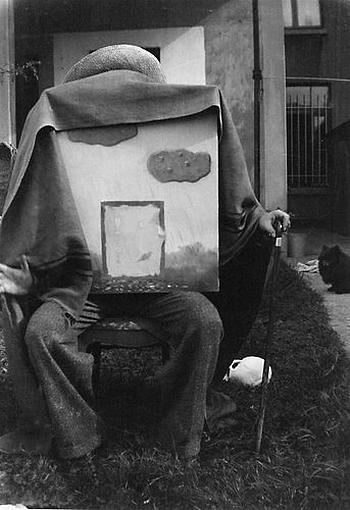
God on the Eighth Day
1937
René Magritte
b. Nov. 21, 1898
_______________________
Volta: A Multilingual Anthology
The International Literary Quarterly
This unusual anthology contains ninety-three poems in ninety-three languages. Ninety-two of these poems are translations of one poem, the ninety-third. The anthology, which began in issue 9 of ILQ, with seventy-five languages, is still growing.
As Richard Berengarten writes in his introduction, this project is “a celebration of multiculturalism and diversity”. Apart from invoking the pleasure of learning about different languages, the anthology opens up many questions. For example: How many languages could this project extend to? Is translatability a universal feature of language itself? What does ‘originality’ actually mean? What difference is there between writing and translating a poem? And could the fact that these poems come from all over the world bear out Octavio Paz’s claim: “For the first time in our history, we are contemporaries of all humanity”?
_______________________

photo - mw
_______________________
some notes of Wittgenstein from Culture and Value
Spurious
I sit astride life like a bad rider on a horse. I only owe it to the horse's good nature that I am not thrown off at this very moment. _______________________
The Reader Learns the Rules of the Game
An interview with Helen Dewitt and two reviews of her latest book
la review of books
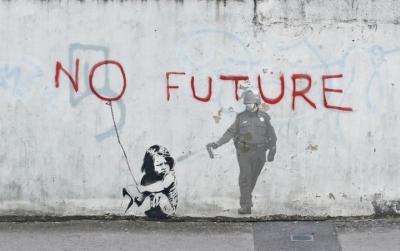
Wall Photos
Occupy Lulz
_______________________
The roots of the UC-Davis pepper-spraying
Glenn Greenwald
It’s easy to be outraged by this incident as though it’s some sort of shocking aberration, but that is exactly what it is not. The Atlantic‘s Garance Franke-Ruta adeptly demonstrates with an assemblage of video how common such excessive police force has been in response to the Occupy protests. Along those lines, there are several points to note about this incident and what it reflects:...(more)
_______________________
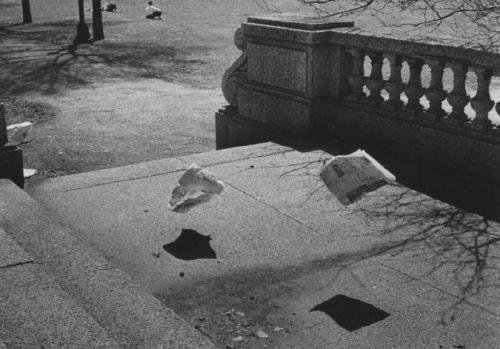
steps
Art Institute of Chicago
Yasuhiro Ishimoto
1950s
_______________________
Interview with Wendy Brown
Broken Power Lines
{ 2010 02 27 }
Wendy Brown: In the Euro-Atlantic world, what we call the West and the Global North, those terms have pretty much become counter-productive for describing a left vision. I think the reason for that is obvious: in the 20th century, for many people, communism as it was actually instated in Eastern Europe, in the Soviet Union, in China, North Korea, a few other places – so much carries the signification of a heavily policed society, of strong and authoritarian states, of what gets called for better or worse totalitarian culture and society – that divesting what we might value in communism in its theoretical formulation and in our political attachments to it, divesting that value from that actual lived history is very difficult in the popular sense. I certainly still teach The Communist Manifesto and try to get students to appreciate what it was that Marx was articulating and imagining. I think it is worth teaching other texts, as well, that do the same thing, but I think it is very difficult at a popular level to make arguments on behalf of communism that don’t simply deposit your argument back with that history. That said, it is probably a little different in the Global South where I think it is possible to speak about Marxism, about socialism and about communism without necessarily having that same recurrence to especially the Soviet Union and the Eastern Bloc. I think it is possible and probably essential there as well, though, to begin to use some other terms.
CPS: Are there any terms you have in mind? Any new signifiers?
Wendy Brown: I don’t particularly have a good answer to that question. In my own work, I have tended to use the language of democracy. In using it I have had to first make a move that is similar to the one I just described with communism, only at another end of the spectrum, which is to separate democracy from its colonization by liberalism. When I talk about a vision of a different world than the one that we have in contemporary market democracies, contemporary Western states neoliberalized and otherwise, unfree and inegalitarian, my first move is to separate democracy from the contemporary versions of it that are used both to legitimate Western states and to legitimate imperial exploits with democracy. My move is always just to remind us of the etymology of the term, that it means very simply in its Greek formulation: the people rule or popular power. There are lots of arguments about the demos; some argue such as Ranciere, that it really means the poor; others argue that it really means the people. Those arguments are interesting but I think what is important in using it is to be able to seize a term that people think they do value, people who are not necessarily on the left, and seize it for left purposes. That is one approach. I am open to other possibilities as well, things that get a little closer to the political economic end of what we used to mean by communism than democracy necessarily does. I am open to ideas that people have about what those terms ought to be.
...(more)
via_______________________
Elements of Style as Occupy Movement Evolves
Alice Rawsthorn
(....)
With or without the hashtag, the word “Occupy” is a good choice for a global movement. It translates easily from English into several other languages including “occuper” in French, “occupare” in Italian, “occupar” in Spanish though not, admittedly, “besetzen” in German. And it is firmly rooted in the history of the protest movement, from the factory occupations by striking workers in the United States during the 1930s to the global student sit-ins of the late 1960s.
In short, “Occupy” is a stellar example of both what is known in marketing as an umbrella brand name and what the anti-corporatists in the movement could call beating them at their own game....(more)
via Jim Johnson
_______________________
Vultures' Picnic: In Pursuit of Petroleum Pigs, Power Pirates and High-Finance Carnivores
Chapter One
Greg Palast
_______________________
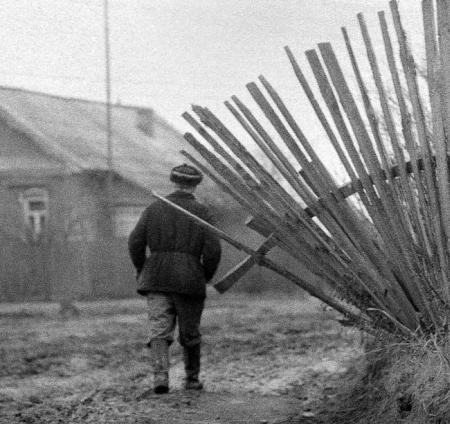
Russians. The province in the early 1980s, 2006
Alexandr Kalion
Poemas del rio Wang
_______________________
Olson Meets Web 2.0
Thomas Fink
eoagh
Let’s say that Charles Olson, who fretted about the short life-spans of his male ancestors as an indicator of his early death in “The K” (Olson, Selected 159), does not die in 1970 at the age of 59. Worn out, he goes underground and just observes the culture for a very long time. In full possession of his faculties, he turns a century old in 2010, and, still holding (but perhaps not too tightly) the perspective of his major critical essays and poetry published in the fifties and sixties, contemplates the cyber-revolution of the new millennium.
(....)
At this moment, Olson is reading Tan Lin’s cyber-inflected, book-length poem/non poem (?), plagiarism/outsource, and he is not unmoved by its meta-moments:
People don’t read text so much as look at it or download multiple reading formats for text. Such practices are not new to ebook reading: skimming, fanning, page flipping, reading books about books, blurb reading, browsing or locating a book in a spectrum of colors, binding styles, shelf-heights, and library floors, or even simple forgetting, etc. constitute earlier non-reading, pre-digital formats of text processing. . . . [T]he retina processes textual matter by silent reading, by jumping from one letter/word group to another in what are termed saccadic leaps. All reading is format-dependent scanning i.e. controlled forgetting. (unpaginated)
Reading this with anxiety, Olson remembers one of the dicta in “Projective Verse,” “ONE PERCEPTION MUST IMMEDIATELY AND DIRECTLY LEAD TO A FURTHER PERCEPTION” (Olson, Selected), as well as a key rhetorical question: “So, is it not the play of a mind we are after, is not that that shows whether a mind is there at all?”. But he is not so sure that his sense of poetic composition is the same kind of process as that experienced by many web-surfers.
...(more)
_______________________
Follow Me Here - 12th aniversary
Congratulations and thanks Eliot - mw
_______________________
Why Wikipedia Is as Important as the Pyramids
Jonathon Keats
The visibility of Wikipedia in scholarly publications
Taemin Kim Park
A Call to Duty:
ASA (American Sociological Association) and the Wikipedia Initiative
Erik Olin Wright
WikiWorld links at Omnivore
_______________________

Leaf
1988
Yasuhiro Ishimoto
1 2
via (OvO)
_______________________
Vengeance First: The ominous Omnibus is at the gates
Ethan Cox
The Conservative government is about to take yet another step to the right of their American cousins.
Bill C-10, the ominous Omnibus bill now tumbling down the pipeline is a mish-mash of nine unrelated bills that form the centrepiece of the Conservative fear-based "law and order" agenda.
The American-style bill would increase incarceration rates by adding new and longer sentences for drug-related crimes, increasing mandatory minimums, scrapping alternate sentencing (such as house arrest), and beefing up sentences for young offenders. That would mean building more jails, for which the unwilling provinces would have to pay. If you build it, they will come.
All this to make our communities safer. But would it? Canada is not the U.S. Our crime rate is at its lowest level since 1973, according to Statistics Canada. There is no crime wave sweeping this country. But even if there were, Bill C-10 would be the worst possible response.
In hearings before the Justice Committee, and in a number of open letters and publicly released statements, one expert after another has explained that moving from a rehabilitation and reintegration approach to justice, to a punitive system based on lengthy prison terms will make us less safe, not more.
The Americans have been down that road and their experience is instructive. Even conservative Republicans have been forced to declare their punitive vision of criminal justice, on which C-10 is modelled, an abject failure.
Tracy Velįzquez, executive director of the American Justice Policy Institute, sums up the unusually bipartisan American response to C-10:
"Republican governors and state legislators in such states of Texas, South Carolina, and Ohio are repealing mandatory minimum sentences, increasing opportunities for effective community supervision, and funding drug treatment because they know it will improve public safety and reduce taxpayer costs. If passed, C-10 will take Canadian justice policies 180 degrees in the wrong direction, and Canadian citizens will bear the costs."...(more)
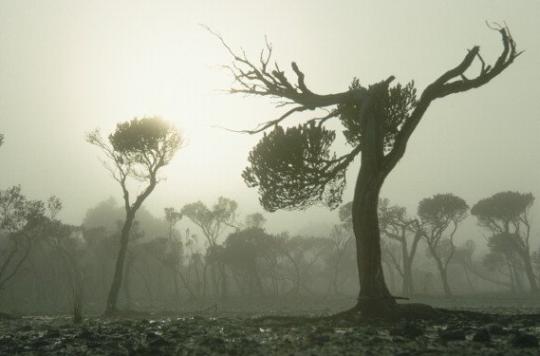
Lake Pedder
Tasmania
1971
Olegas Truchanas
1923 - 1972
National Library of Australia
via
_______________________
Sanatorium Under the Sign of the Hourglass
Bruno Schulz
(July 12, 1892 - November 19, 1942)
translated by Celina Wieniewska
epub version available here
(....)That whole lumber room of ancient beauty has been subjected to a painful distillation under the pressure of years of boredom.
"Can you understand," my father used to ask, "the despair of that condemned beauty, of its days and nights? Over and over again it had to rouse itself to fictitious auctions, stage successful sales and noisy, crowded exhibitions, become inflamed with wild gambling passions, await a slump, scatter riches, squander them like a maniac, only to realize on sobering up that all this was in vain, that it could not get anywhere beyond a self-centered perfection, that it could not relieve the pain of excess. No wonder that the impatience and helplessness of beauty had at last to find its reflection in our sky, that it therefore glows over our horizon, degenerates into atmospheric displays, into these enormous arrangements of fantastic clouds I call our second or spurious fall. That second fall of our province is nothing but a sick mirage projected through an expanse of radiation into our sky by the dying, shut-in beauty in our museums. Fall is a great touring show, poetically deceptive, an enormous purple-skinned onion disclosing ever new panoramas under each of its skins. No center can ever be reached. Behind each wing that is moved and stored away new and radiant scenes open up, true and alive for a moment, until you realize that they are made of cardboard. All perspectives are painted, all the panoramas made of board, and only the smell is authentic, the smell of wilting scenery, of theatrical dressing rooms, redolent of grease paint and scent. And at dusk there is disorder and chaos in the wings, a pileup of discarded costumes, among which you can wade endlessly as if through yellowed fallen leaves. There is great confusion: everybody is pulling at the curtain ropes, and the sky, a great autumnal sky, hangs in tatters and is filled with the screeching of pulleys. And there is an atomsphere of feverish haste, of belated carnival, a ballroom about to empty in the small hours, a panic of masked people who cannot find their real clothes.
a different online translation here
_______________________
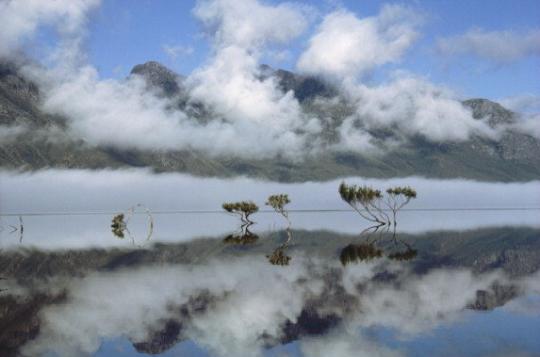
Olegas Truchanas
_______________________
Two Poems
Brian Lucas
conjunctions
Frond Vault
(....)
He had never once used those words, nor even learned to handle the instrument that would’ve made their written form possible. The words in question were discovered in a volume formed in concentrically rippling circles, flat like a sundial. Between each letter there rose (or was it emanated?) a fragrance that could be seen by those standing at a slight angle to the page. The curls and indentations this fragrance left in the air was enough to cause the onlookers to be paralyzed. If all hallucinations could be true, and not only a matter of physiological perspective, the world and its words would be held captive by a possibility of olfactory interpretations and reinterpretations lying over the seasons like a palimpsest of the brain’s canals during monsoon.
(....)
...(more)
_______________________
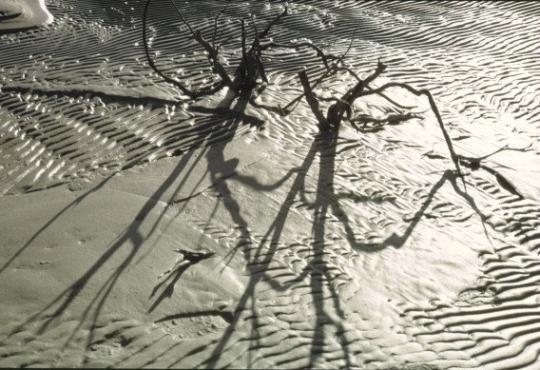 Sand, wind and water
Lake Pedder
1969
Olegas Truchanas
_______________________
From “Bringing the Text Back Home” (first excerpt)
Karl Young
presented by Jerome Rothenberg
“Loss” is an enormous word. It can range from triviality, as in the loss of a penny, to the destruction of that which is most important in an individual life or that of a culture or race. It may come about as the result of the sort of chance that has no room for meaningful synchronicity to betrayal to the most severe forms of malice. That penny I just mentioned could be extremely important to a coin collector. Still, this is small in relation to the losses of the Holocaust, the Gulags, or the nuclear weapons used against Japan. My current project, “Bringing the Text Back Home” concludes a long cycle for me, with the translation of two books written in the 1970s. In this project, I explore poetic possibilities of written fragments; that is, scraps of writing on the extreme cusp of being lost. ...(more)
_______________________
 Sunrise on Mount Solitary
Olegas Truchanas
_______________________
Throwing Out the Master’s Tools and Building a Better House
Rebecca Solnit
The state would like us to be violent. Violence as cooptation tries to make us more like them, and if we’re like them they win twice—once because being unlike them is our goal and again because then we’re then easier to imprison, brutalize, marginalize, etc. We have another kind of power, though the term nonviolence only defines what it is not; some call our power people power. It works. It’s powerful. It’s changed and it’s changing the world.
The government and mainstream-to-right media often create fictions of our violence, from the myth that protesters were violent (beyond property damage) in Seattle in 1999 to the myth of spitting in returning soldiers’ faces in the Vietnam era to generally smearing us as terrorists. If we were violent, we’d be conventionally dangerous and the authorities could justify repressing us. In fact, we’re unconventionally dangerous, because we’re not threatening physical violence but the transformation of the system (and its violence). That is so much more dangerous to them, which is why they have to lie about (or just cannot comprehend) the nature of our danger.
So when episodes of violence break out as part of our side in a demonstration, an uprising, a movement, I think of it as a sabotage, a corruption, a coercion, a misunderstanding, or a mistake, whether it’s a paid infiltrator or a clueless dude. Here I want to be clear that property damage is not necessarily violence. The firefighter breaks the door to get the people out of the building. But the husband breaks the dishes to demonstrate to his wife that he can and may also break her. It’s violence displaced onto the inanimate as a threat to the animate....(more)
via Jim Johnson
_______________________
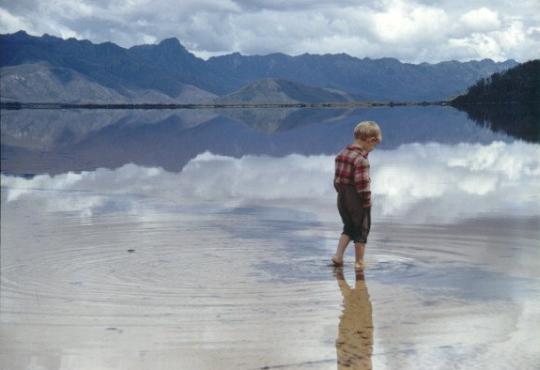
Olegas Truchanas
_______________________
Contingency, Irony, and Solidarity
Richard Rorty
pdf available at AAAAARG - free reg. req.
If we could bring ourselves to accept the fact that no theory about the nature of Man or Society or Rationality, or anything else, is going to synthesize Nietzsche with Marx or Heidegger with Habermas, we could begin to think of the relation between writers on auronomy and writers on justice as being like the relation between two kinds of tools - as little in need of synthesis as are paintbrushes and crowbars. One sort of writer lets us realize that the social virtues are not the only virtues, that some people have actually succeeded in re-creating themselves. We thereby become aware of our own half-articulate need to become a new person, one whom we as yet lack words to describe. The other sort reminds us of the failure of our institutions and practices to live up to the convictions to which we are dready committed by the public, shared vocabulary we use in daily life. The one tells us that we need not speak only the language of the ribe, that we may find our own words, that we may have a responsibility to ourselves to find them. The other tells us that that responsibility is not the only one we have. Both are right, but there is no way to make both speak a single language.
This book tries to show how things look if we drop the demand for a theory which unifies the public and private, and are content to treat the demands of self-creation and of human solidarity as equally valid, yet forever incommensurable. It sketches a figure whom I call the "liberal ironist."
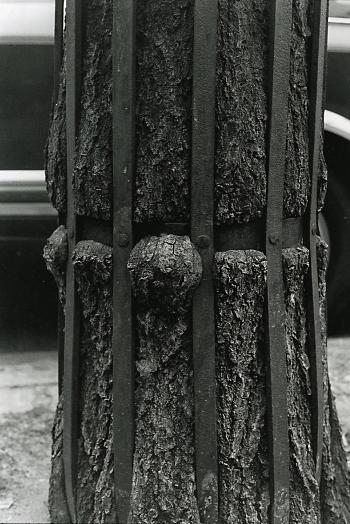
Zoe Leonard
_______________________
Autumn’s child
Extracts from the novel Blad ur höstens arkiv. Tomas Skarfelts anteckningar
(‘Leaves from autumn’s archive. The notes of Tomas Skarfelt’)
Bo Carpelan
Translated by David McDuff
books from finland
When I took my first walk here in Udda, along the road down to the end of the bay, my legs wanted to go left up to the forest, while I strove to walk straight ahead. It was an unsteadiness reminiscent of being slightly drunk. A slight vertigo I have already noticed before. Trees soughed through me and the water of the bay tasted almost like salt on my lips. All sorts of things try to pass straight through me nowadays. I am becoming a general store. The few people I know go there and choose, and I try to sell. Most of it is old memories with attendant dust. They are in no chronological order at all, and make involuntary, rapid leaps, like kangaroos. Even when I went to school they hopped around. They forced me to learn my lessons by heart. They continued to skip over me at university and added an extra complexity to my studies in general history: concentrate of reign lengths.
And if I followed my legs and gave not a damn about my dead straight road? Digressions from what was planned provided me later on with my best experiences, and coincidences were grains of gold. Improvisations were lucky throws, or disasters. Afterwards came the restrictions, the constructions, the architecture. Now only that squared-paper notebook remains with its pitfalls. The uncertainty is sometimes imperceptible, but is there: Am I not superfluous? Are not my legs somewhat irrational?
Entangled in such questions, as in a magpie’s nest or in Kafka’s Odradek, I go forward, a dry leaf among a large number of other dry leaves. I reach the empty beach and hear happy voices echoing far away: Finnish children in ‘swimming costumes’ and Swedish tourist children in ‘bathing trunks’. Come on! the Swedish ones shout to the Finnish, but no one comes on, only the autumn wind. Chaos lurks in treetops and above the waters.
I turned and quickly came back. Now my legs walk straight and in harmony with my I, as it is called nowadays.
I annotate myself.
...(more)
_______________________
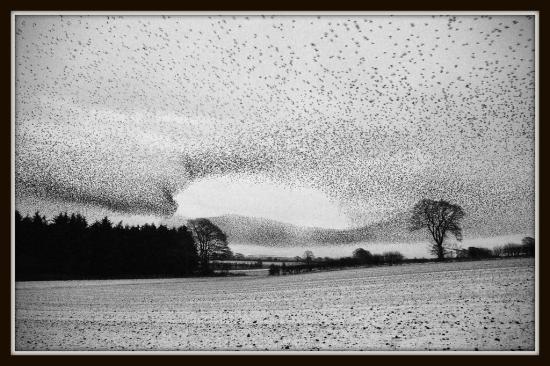
Owen Humphreys
Murmurations
_______________________
II. We are Resurrected
chapter 2 of Satantango
Laszló Krasznahorkai
translated by George Szirtes
Almost Island
(....)
The precise, dry, unfamiliar language ('the shadow of suspicion that has fallen') left them in no doubt that it was not a matter of proving their innocence, for to deny the charge or, conversely, to demand a hearing, would be a pointless waste of time, if only the opportunity might arise for a general chat where they might state their position regarding an all-but-forgotten matter, establish their identities and perhaps modify a few personal details. In the past, seemingly endless, months, ever since a stupid difference of opinion so slight it is hardly worth mentioning, had led them to being cut off from normal life, their earlier, now clearly frivolous, views had matured to a firm conviction, and if opportunity arose they could answer correctly any questions regarding such general ideas as might be grouped together under the heading of a 'guiding principle' with startling certainty and without any torturous inner struggle; in other words they were beyond surprise now. And as regards this self-consuming and constantly recurring state of panic they could take courage and put it down to 'the bitter experience of the past' because 'no man could have got out of such a hole without some injury'. The big hand is moving steadily closer to twelve when an official appears at the top of the stairs, his hands behind him, moving on light steps, his whey-coloured eyes clearly fixed ahead of him until they are drawn to the two strange characters sitting there, when a faint flush of blood enters his grey, hitherto dead-looking face and he stops, raises himself on tip-toe, then, with a tired grimace, turns away again to disappear down the stairs, taking time only to look up at the other clock hanging beneath the NO SMOKING notice by which time his face has returned to its normal grey. The taller of the two men assures his companion, saying, “The two clocks say different times, but it could be that neither of them is right. Our clock here,” he continues, pointing to the one above them with his long, slender and refined index finger, “is very late, while that one there measures not so much time as, well, the eternal reality of the exploited and we to it are as the bough of a tree to the rain that falls upon it: we are helpless against it.” ...(more)
.....................................................
"There isn't anything anywhere any more"
An interview with Laszló Krasznahorkai
_______________________
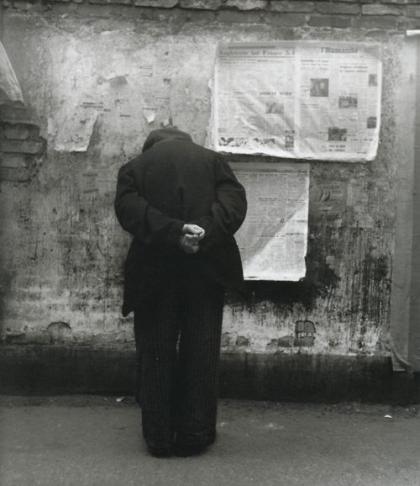
The Reading Wall
Louis Stettner
Paris, circa 1950-51
_______________________
We must read if we want to live, W. says. We may have forgotten how to live, but they – the authors of the books in his man bag – have not.
@UtterlySpurious
_______________________
Dissing God
Jonathan Rée
Genesis got off to a bad start, narratologically speaking, with God creating one good thing after another and seeing that each of them was good: the device has the makings of a bedtime soporific rather than a page-turner. God, it would seem, is the death of narrative, and narrative the death of God.
_______________________
Visiting Mallarmé about Acting Today
David Lau
(....)
We find ourselves enmeshed in the difficult, laboring intensity of thought. The first take on action doesn’t look promising. We’re told that we think we push upon the webbing of the word and world and produce an original movement, so to speak, but we can’t be sure that anything happens or, by extension, that we exist a priori. Instead, we run up against the problematic nature of the “subject” in modern philosophy (numinous for some, changeling for others), the thwarted, continuous difficulty of trying to establish determinations of ourselves and of the world. This “subject” accompanies the externalization of mankind’s powers into tools and their later alienation into large-scale machines. We emerge out of a paleontologically thicketed environment, with conflicts of being and political opinion, the foreboding prospect of generational diminishment, looking for some foothold from which to execute our act. The problems recall Hamlet’s indecisive attempts to act in a situation of personal and historical impasse, in which, as Mallarmé will put it towards the end, “the past seems to cease and the future to stall.”
Our agreed upon problem is writing: “this praxis/practice” (“cette pratique”) of writing goes in two general directions. You work deliberately, thinking, willing, for a lifetime in pursuit of “some dazzling multiple”; or you try to publish in the journals and find a press for your book, with the immunity of doing nothing at all as a result. Mallarmé opted for the former of the two options; that’s where the stress fell. Political action seems irremediably foreclosed for the writer....(more)
Lana Turner: A Journal of Poetry and Opinion
_______________________
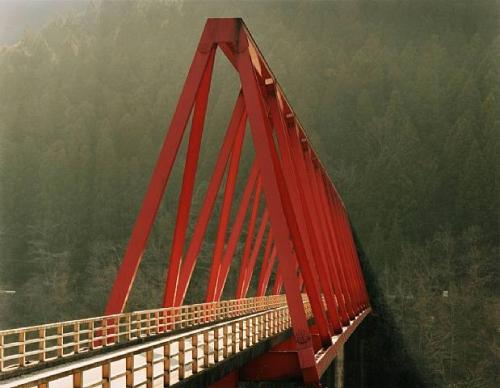
Okawa Village, Kochi Prefecture
Toshio Shibata
2007
1 2 3
_______________________
Copyleft and the theory of property
Mikhaļl Xifaras
Translation by Mike Routledge
(....)What comes next? The end of the story, or something that takes us one stage beyond intellectual capitalism? One thing is certain: whilst mature capitalism stands squarely on a platform of extensive and solid intellectual property, a bitter battle is being fought between its supporters and those who defend the idea of "common property", of "the public domain" of what is "free" (without charge). Is this merely resistance by old forms of cooperation that have been crushed by the expansion of informational capitalism, or is it a forerunner of "a hitherto unheard-of social transformation", characterized by the emergence of a form of "informational communism"? Perhaps the most spectacular of these conflicts is the free software movement's challenge to manufacturers of "proprietary" software programmes....(more)
_______________________
Occupy and anarchism's gift of democracy
David Graeber
(....)
This is not the first time a movement based on fundamentally anarchist principles – direct action, direct democracy, a rejection of existing political institutions and attempt to create alternative ones – has cropped up in the US. The civil rights movement (at least, its more radical branches), the anti-nuclear movement, the global justice movement … all took similar directions. Never, however, has one grown so startlingly quickly.
To understand why, we have to understand that there's always been an enormous gap between what those ruling America mean by "democracy", and what that word means to almost anyone else....(more)
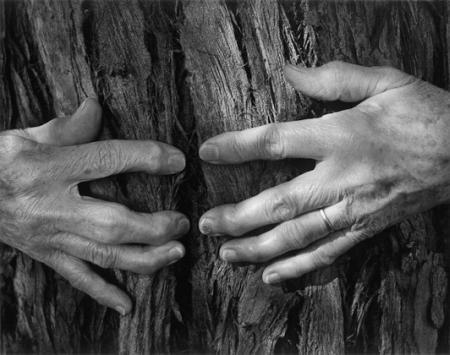
Woman's Hands
Wynn Bullock
1954 1 2 3
_______________________
Error:Glitch, Noise and Jam in New Media Cultures
Edited by Mark Nunes
pdf available at library.nu
gigapedia as was
free reg. req.
Error, Noise, and Potential:
The Outside of Purpose
Mark Nunes
(....)We need no longer speak of a “coming age” of the network society. Today, a majority of our social interactions assume the proper, effi cient functioning of global, digital networks. How we conduct business, exchange ideas, entertain ourselves, and participate in politics relies upon dependable fl ows of information. This network society is governed by what Jean-Francois Lyotard defi ned more than thirty years ago as a “logic of maximum performance”:1 a cybernetic ideology driven by dreams of an error-free world of 100 percent effi ciency, accuracy, and predictability.
Given the growing dominance of this ideology of informatic control, error provides us with an important critical lens for understanding what it means to live within a network society. Error reveals not only a system’s failure, but also its operational logic. This logic of maximum performance demands that error is either contained as predictable deviation, “captured,” for example, by the all-too-familiar error messages of everyday life, or nullifi ed as an outlying and asignifying event. Occasionally, though, error slips through. In these moments, error calls attention to its etymological roots: a going astray, a wandering from intended destinations. In its “failure to communicate,” error signals a path of escape from the predictable confi nes of informatic control: an opening, a virtuality, a poiesis.
(....)
_______________________
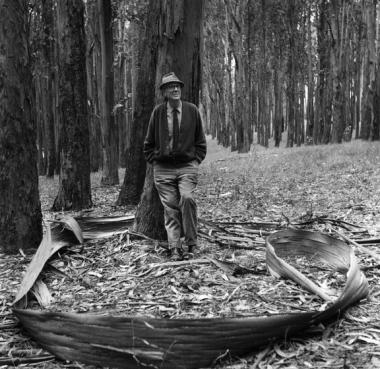
Wynn Bullock
(April 18, 1902 – November 16, 1975)
photo - Imogen Cunningham
1966
_______________________
Calamities
Renee Gladman
Triple Canopy
I BEGAN THE DAY THINKING that in order to write a talk on “The Ongoing Story” I would need to incorporate it into these essays I’d been writing about my life. I began, “I began the day staring into the face of the question of narrative—was anybody still interested in it, and, if so, why?” It was a simple question to ask but had taken me eight days to write—you’d think it impossible to construct a sentence two words at a time, writing two words then taking the rest of the day off then on the next day writing two more words, maintaining the thread the whole time, until finally, on the eighth day, you had it, the sentence, but this sometimes happened when you were writing about narrative inside of narrative. Recently, I had found that to talk about something that was in essence everything was simply too exhausting, and that the only way around it was to talk about the question of the thing rather than the thing itself, since in the end, it would become both. “Narrative—” I went on with my talk, “Was anybody still interested? I didn’t want to open my eyes to it. I hadn’t wanted to think about narrative at the same time that I was conscious of my body lying in the object world. It was a problem of space similar to what Martha and I were discussing yesterday: Was it possible to say that something was gathering outside of a thing with the intention of meeting something else when this something else was the larger space in which that first thing existed? Could I talk about narrative as I was operating within it? I closed the quotes enclosing the text for my talk and took a train to New York. ...(more)
_______________________
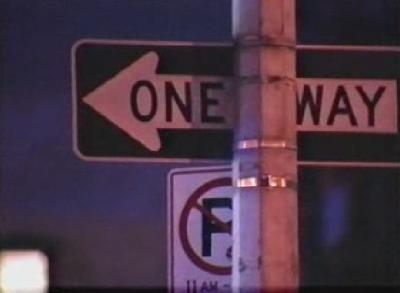
One Way Street: Fragments for Walter Benjamin
Directed by John Hughes
(1993)
Duration: 58 min.
ubu film
_______________________
Literary Melancholy
Lars Iyer interviewed by David Winters
(....)You mention that Modernism might have revealed the ‘truth’ of literature. I am cautious about such a view. For me, the name ‘Modernism’ is too strongly tied to a time, perhaps also to a place, to become trans-historical in the manner you suggest. I can never quite see how Modernism could lift itself from its conditions to become something like a messianic ‘promise’ of literature. I don’t see how this promise would work now, when, it seems to me, we have been removed from the conditions under which what we call ‘Modernism’ was possible.
What does this remove amount to? Few people now read as they once did. This is part of it. A whole idea of culture has moved out of reach. This is another part of it, although it is probably the effect of something else. I think the answer might lie in Fredric Jameson’s diagnosis of ‘late capitalism’, or in the Italian Marxists’ claim that there has been a ‘step change’ in the degree to which life is subsumed by capital. And I am drawn to my favourite blogs – Steve Mitchelmore’s This Space among them – because they reflect on such changes. Kafka said, ‘There is infinite hope, but not for us’. I would say, ‘There is Modernism, but not as the condition of our literature’. And perhaps there is no literature either…
...(more)
_______________________

Boy Fishing
Wynn Bullock
1959.
|

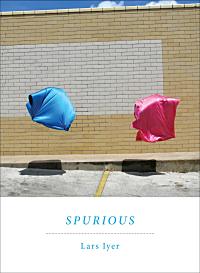


 The Age of Briggs & Stratton
The Age of Briggs & Stratton













































